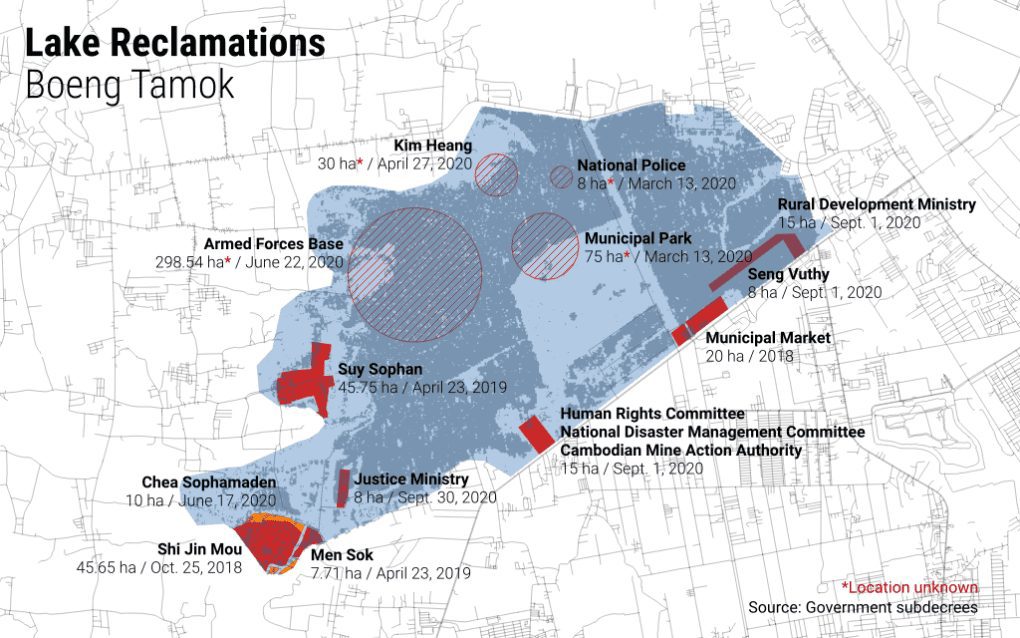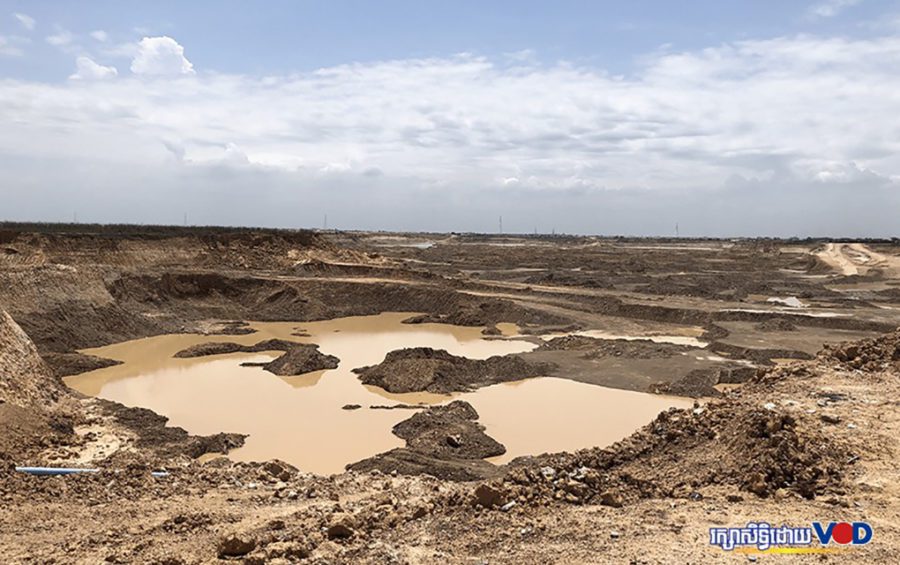As he presides over a newly formed Sihanoukville “Master Plan” council, Prime Minister Hun Sen has granted four plots of land in Preah Sihanouk province to seven individuals, plus two more Phnom Penh lake areas to businesswoman Chea Sophamaden and City Hall.
According to an official sub-decree, Sophamaden received 10.5 hectares on Boeng Tamok, one of Phnom Penh’s “last lakes,” amid a series of recent allocations that have carved up more than 500 hectares from the 3,200-hectare lake and has prompted concerns that flooding in the city could worsen in the future.
In the past two weeks, rain and flooding across the country has killed at least 34 people and affected more than 320,000 hectares of farmland, according to a National Committee for Disaster Management statement on Wednesday.
The sub-decree concerning Boeng Tamok signed by Hun Sen — dated June 17 and obtained this week — asks the ministries of interior, finance and land management as well as Phnom Penh authorities to implement the handover immediately.
Commerce Ministry records say Sophamaden is chairperson of the Park Development in Chbar Ampov.

In a separate sub-decree dated July 24, Hun Sen allocated 7 hectares from Ou Andet lake in Kambol district’s Boeng Thom commune to Phnom Penh City Hall.
Meanwhile, in Preah Sihanouk, Hun Sen now heads a “Master Plan” council to develop Sihanoukville into a special economic area serving multiple sectors. The council has 26 members, including 18 government ministers and Hun Sen as the head, according to a royal decree on its creation dated May 30.
The council will oversee interministerial committees tasked with developing the economic master plan as well as land-use policies.
In three separate sub-decrees between March and July, the prime minister granted nearly 130 hectares for four plots in Sihanoukville and Prey Nob district to Chea Vandeth, Heng Ty, Ly Hak, Prom Vy, Sok Ly, Um La and Um Tong. All three sub-decrees say the grants were requested by Land Minister Chea Sophara.
- 25 hectares in Sihanoukville’s Muoy and Buon communes to Chea Vandeth, Prom Vy, Sok Ly, Um La and Um Tong.
- 51 hectares in Prey Nob’s Bit Traing commune to Chea Vandeth, Prom Vy, Sok Ly, Um La and Um Tong.
- 21 hectares in Muoy commune, on the outskirts of Sihanoukville, to Heng Ty.
- 32 hectares in Muoy commune, on the outskirts of Sihanoukville, to Ly Hak.
Provincial spokesperson Kheang Phearum said the local administration was only implementing orders, and the reasons for the land allocations went beyond its jurisdiction.
Neither the documents nor a government spokesperson explained what the allocations were for, or what the government got in return for them.
Transparency International Cambodia executive director Pech Pisey said people had the right to know what was happening to state property.
“The most important thing is transparency and accountability when providing public property to an individual or company — it is a must that the information is open and widely available,” Pisey said.
The price should be disclosed, and the government must guarantee that the recipient will not harm the public interest, he said. Providing such information was the government’s responsibility, and should not be up to the public to figure it out, he added.
Moreover, the government’s current disclosures often masked the true interests behind the transactions, he said. “Generally we know only a company name and not who is the real owner,” Pisey said.
Observers of Cambodia have often noted a patronage system in the country, where tycoons and government officials work in lockstep by bestowing favors to one another. Pisey said such a system dragged down economic growth and failed to protect the public interest.
People were becoming concerned about Phnom Penh’s lakes because of the lack of transparency, which makes them suspect collusion, he said. “People just don’t know, and it makes them suspicious,” he said.
Studies of impacts needed to take into account the potential harm to livelihoods as well as the environment, he added. “Boeng Tamok is a huge lake, and it is the last lake,” Pisey said. “If we fill up the lake, there will be a huge impact.”
Government spokesperson Phay Siphan said the key question was what the government was receiving in return for the allocations of state land — a question he said he did not know the answer to.
“It could be a swap — I don’t know,” Siphan said. “Sometimes the state needs land in a better location, and it [can get it by] swapping it.”
For example, he said, the city’s southern Boeng Tompun lake was filled-in in exchange for money to build a drainage system. With big houses and villas emerging, the city needs better drainage, he said.
“Sometimes the state gives the land but it gets benefits in return,” Siphan said.
In Preah Sihanouk, the land may have been sold to pay for roads, the spokesperson suggested, “because we very much need them.”
He added that government ministries had already discussed the potential environmental impact of the infilling of lakes in Phnom Penh — Siphan said flooding was about drainage not lakes — while the Finance Ministry advised Hun Sen on whether he was getting a fair price for the land.
Asked about a lack of transparency around who received the allocations, and about people close to the government being favored, Siphan said the process was transparent enough and any further complaint was a matter for the courts to resolve.
“I hear that in the news, but we don’t have clear evidence. If there’s clear evidence, the courts will make a judgment,” he said.
City Hall spokesperson Met Measpheakdey could not be reached for comment.












